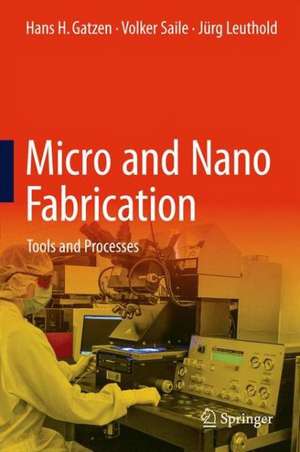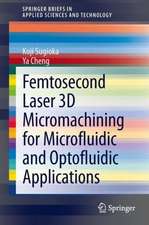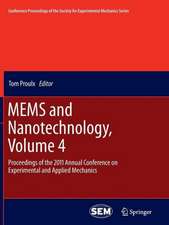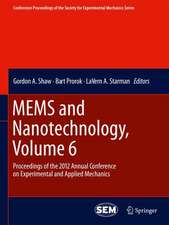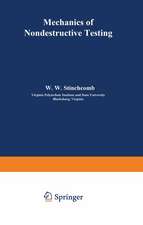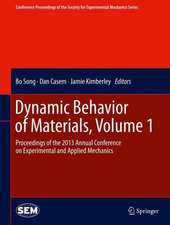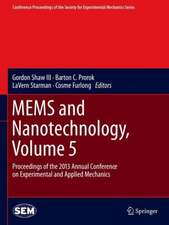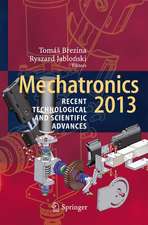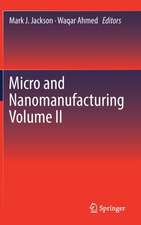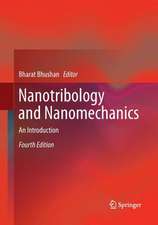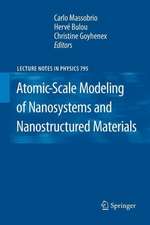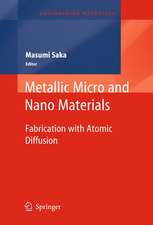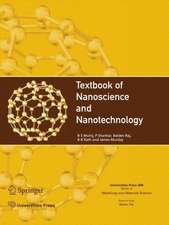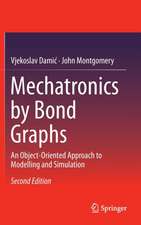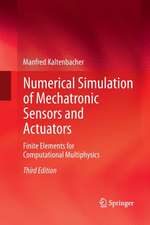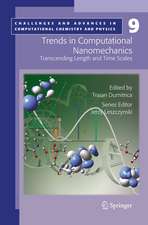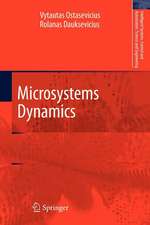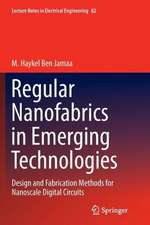Micro and Nano Fabrication: Tools and Processes
Autor Hans H. Gatzen, Volker Saile, Jürg Leutholden Limba Engleză Hardback – 20 ian 2015
| Toate formatele și edițiile | Preț | Express |
|---|---|---|
| Paperback (1) | 596.19 lei 6-8 săpt. | |
| Springer Berlin, Heidelberg – 6 oct 2016 | 596.19 lei 6-8 săpt. | |
| Hardback (1) | 744.84 lei 6-8 săpt. | |
| Springer Berlin, Heidelberg – 20 ian 2015 | 744.84 lei 6-8 săpt. |
Preț: 744.84 lei
Preț vechi: 908.34 lei
-18% Nou
Puncte Express: 1117
Preț estimativ în valută:
142.54€ • 154.78$ • 119.74£
142.54€ • 154.78$ • 119.74£
Carte tipărită la comandă
Livrare economică 22 aprilie-06 mai
Preluare comenzi: 021 569.72.76
Specificații
ISBN-13: 9783662443941
ISBN-10: 3662443945
Pagini: 450
Ilustrații: XXVI, 519 p. 357 illus., 54 illus. in color.
Dimensiuni: 155 x 235 x 35 mm
Greutate: 0.94 kg
Ediția:2015
Editura: Springer Berlin, Heidelberg
Colecția Springer
Locul publicării:Berlin, Heidelberg, Germany
ISBN-10: 3662443945
Pagini: 450
Ilustrații: XXVI, 519 p. 357 illus., 54 illus. in color.
Dimensiuni: 155 x 235 x 35 mm
Greutate: 0.94 kg
Ediția:2015
Editura: Springer Berlin, Heidelberg
Colecția Springer
Locul publicării:Berlin, Heidelberg, Germany
Public țintă
Upper undergraduateCuprins
Introduction-MEMS, a Historical Perspective.- Vacuum Technology.- Deposition Technologies.- Etching Technologies.- Doping and Surface Modification.- Lithography.- LIGA.- Nanofabrication by Self-Assembly.- Enabling Technologies I - Wafer Planarization and Bonding.- Enabling Technologies II - Contamination Control.- Device Fabrication - An Example.
Recenzii
“The book is clearly written and easy to read. Thevarious topics are balanced and well organized. … The numerous figures andschematics are the most useful tools of the book. … It is useful to studentsand newcomers, but also experts may find it a good reference because there aresome useful aspects not easily found in other books … . the book offers a goodopportunity to go through the basic semiconductor fabrication technologies.” (RosariaA. Puglisi, MRSBulletin, Vol. 40, October, 2015)
“Provide an excellent summary and explanation for nearly every micro and nano fabrication subject that readers could possibly be interested in learning about. … this work is useful as an instructional aid with comprehension questions at the end of each chapter, as well as a chapter that contains a start-to-finish example of device fabrication. … Summing Up: Recommended. Lower- and upper-division undergraduates, graduate students, and two-year technical program students.” (N. M. Fahrenkopf,Choice, Vol. 52 (12), August, 2015)
“Provide an excellent summary and explanation for nearly every micro and nano fabrication subject that readers could possibly be interested in learning about. … this work is useful as an instructional aid with comprehension questions at the end of each chapter, as well as a chapter that contains a start-to-finish example of device fabrication. … Summing Up: Recommended. Lower- and upper-division undergraduates, graduate students, and two-year technical program students.” (N. M. Fahrenkopf,Choice, Vol. 52 (12), August, 2015)
Notă biografică
Hans Gatzen received a PhD equivalent in Mechanical Engineering from the RWTH Aachen in Aachen, Germany, and held various positions in the computer peripherals industry in Germany and the U.S. from 1973 to 1992. In 1992, he founded the Institute for Microtechnology (imt) at the Hanover University in Hanover, Germany (now Leibniz Universität Hannover) and was its director until his retirement in 2010. He is a Fellow of the American Society of Mechanical Engineers (ASME) and a member of Acatech (National Academy of Science and Engineering).
Volker Saile received a PhD in Physics from the Ludwigs-Maximilians-Universitaet München (LMU), and was later employed as a Staff Scientist at the Deutsches Elektronen-Synchrotron DESY in Hamburg, Germany, until 1989. From 1989 to 1998, he served as the Director of the J. Bennett Johnston, Sr., Center for Advanced Microstructures and Devices (CAMD), Baton Rouge, Louisana, USA. Since 1998, he is Professor of Microstructure Technology at the Karlsruhe Institute of Technology (KIT). Currently, he serves as Head of the KIT Division 5, Physics and Mathematics.
Juerg Leuthold is the head of the Institute of Electromagnetic Fields (IEF) at ETH Zurich, Switzerland. His research interests are in the field of nano-photonics, plasmonics, integrated optics and optical communications. From 2004 to 2013 he was a full Professor at the Karlsruhe Institute of Technology (KIT) in Germany and from 1999 to 2004 he was affiliated with Bell Labs,
Lucent Technologies.
Volker Saile received a PhD in Physics from the Ludwigs-Maximilians-Universitaet München (LMU), and was later employed as a Staff Scientist at the Deutsches Elektronen-Synchrotron DESY in Hamburg, Germany, until 1989. From 1989 to 1998, he served as the Director of the J. Bennett Johnston, Sr., Center for Advanced Microstructures and Devices (CAMD), Baton Rouge, Louisana, USA. Since 1998, he is Professor of Microstructure Technology at the Karlsruhe Institute of Technology (KIT). Currently, he serves as Head of the KIT Division 5, Physics and Mathematics.
Juerg Leuthold is the head of the Institute of Electromagnetic Fields (IEF) at ETH Zurich, Switzerland. His research interests are in the field of nano-photonics, plasmonics, integrated optics and optical communications. From 2004 to 2013 he was a full Professor at the Karlsruhe Institute of Technology (KIT) in Germany and from 1999 to 2004 he was affiliated with Bell Labs,
Lucent Technologies.
Textul de pe ultima copertă
For Microelectromechanical Systems (MEMS) and Nanoelectromechanical Systems (NEMS) production, each product requires a unique process technology. This book provides a comprehensive insight into the tools necessary for fabricating MEMS/NEMS and the process technologies applied. Besides, it describes enabling technologies which are necessary for a successful production, i.e., wafer planarization and bonding, as well as contamination control.
Caracteristici
Describes the tools required for fabricating MNEMS systems Gives insight into the process technologies Fits for practitioners and students of MNEMS Includes supplementary material: sn.pub/extras
